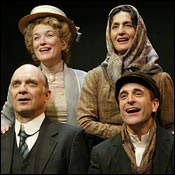
Clichés, platitudes, banalities—you may have to rack your brains for one that hasn’t wandered into The Immigrant. Why am I saying “wandered”? Every conceivable commonplace seems to have been solicited and lovingly nurtured by the wretched concocters of this two-and-a-half-hour pile of—no, I’m not going to say it. But this is a show that only a garden in need of human fertilizer could love.
Originally written as a play by Mark Harelik, and produced by the undistinguished Denver Center for the Performing Arts in 1985, then turned into a musical by Harelik with music by Steven M. Alper and lyrics by Sarah Knapp, The Immigrant was first mounted in 2002 by the Collaborative Arts Project 21 (actually, 21 artists in search of a worthwhile project). The work is now brought to us by Hello Entertainment, which might for this occasion change its name to Goodbye. Couldn’t someone have directed it toward the nearest Dumpster?
In a grandstanding program note, Harelik (who also wrote the vastly overrated Hank Williams: Lost Highway) explains that this is the story of his grandparents, Haskell and Leah Gorehlik, immigrants from Russia who settled in the tiny central-Texas town of Hamilton in 1909, and were the only Jews there. According to the show, Haskell pulls up his pushcart loaded with bananas and all his earthly goods to the front door of the banker Milton Perry and his wife, Ima, and asks in Yiddish for water and a place to stay. After prolonged linguistic cross-purposes, Milton, grumpily yielding to Ima’s suasion, takes Haskell in. When Ima discovers that Haskell is not only a stranger, whom Christian charity must succor, but also a Jew, the deal is nearly off. But Milton abides by his word, and the rest—a predictably heartwarming success story—is Harelik family history, where it might as well have stayed.
Since the tale impinges on the whole town, including the birth and education of the three Harelik children born there, a cast of four (two Perrys and two Hareliks) seems unduly Procrustean. And since the Hareliks and Perrys become close friends, the latter’s discovery of various Judaica (Shabbes, kosher, yarmulkes, etc.) only years later rings somewhat false. The Perrys, needless to say, are just as much Christian stereotypes as the Hareliks are Jewish ones. The show would have seemed retrograde in a shtetl a century ago.
And then there is the score. A Hungarian proverb has it that even a blind hen occasionally finds a grain of corn. Alper and Knapp don’t quite have the luck of a blind hen: Though their score is corny enough, there isn’t a grain of musical or verbal skill in it. They haven’t hit on one passable song, and when, on top of that, several clinkers are reprised—“The Stars” no fewer than four times—we get some idea of what Chinese water torture must feel like. Sample lyrics: “Why do the stars in the night shine so bright / Lighting our way through the dark? / When hope has died and dreams seem ever far / Look up, look up from where you are.” Or this, from Haskell to Milton: “We don’t see eye to eye I guess / That’s why we’ve ended up in this mess / We’re different / Believe different / See the world in a different way / Wouldn’t you say?” And there’s music to match!
Cass Morgan and Walter Charles are heroically passable as the Perrys, but Adam Heller and Jacqueline Antaramian, as the Hareliks, carry unprepossessingness to unnecessary heights. Neither Randal Myler’s direction nor the scenery by Ralph Funicello and Brian Webb can lay claim to much imagination, and Don Darnutzer’s lighting only makes flatness flatter. The composer provided his own arrangements and orchestrations for a four-piece band, achieving little beyond a faint klezmerizing.
But Mark Harelik assures us in his note that “by our single potent glance back [our ancestors’] invisible lives are made worthy and meaningful and immortal.” And further: “I must tell you this story, for it’s all that remains of a good man’s life, and all that’s immortal in me.” What price immortality? Haskell was selling his bananas for a penny apiece; it would seem that immortality comes at roughly the same price.
If by some mischance you are dragged to The Immigrant, you must find your own palliative. You might amuse yourself by counting the number of times Ima calls other characters by her mother’s name, Dora. Or bet your companion whether the show, poor as it is, will get a standing ovation. At the performance I attended, it got an 80 percent one—80 percent more than it deserved. Or you might opt for an early exit, but watch the tricky stairs, what with no stars to light your way through the dark.

The Immigrant’s story lies in the past, but not so the media that allowed playwright Mark Harelik to collaborate so quickly with composer Steven Alper and lyricist Sarah Knapp. “Thank God for the digital age,” says Harelik, who lives in L.A., and traded lyrics, song files, and demos with the New York writers online. “Gilbert and Sullivan would have been much happier with each other if they had digital communication.”
The Immigrant
Directed By
Randal Myler.
Hello Entertainment. At Dodger Stages.